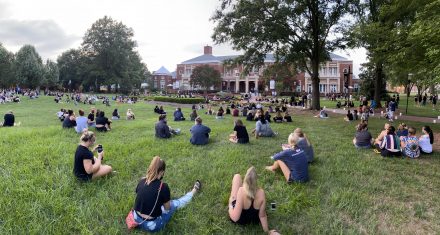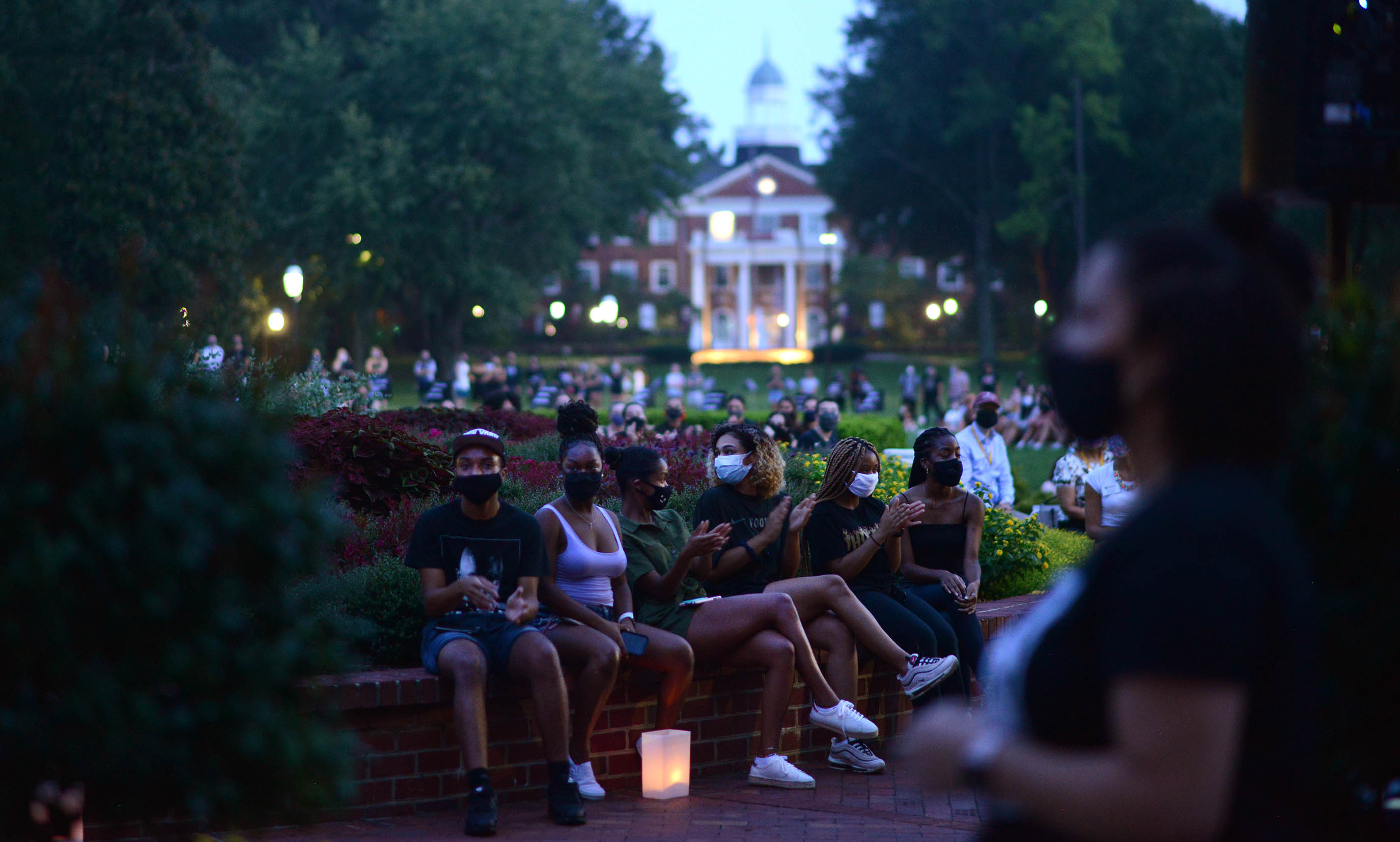The event organized by the Black Student Union provided members of the Elon community a chance to come together and advocate for change.
Hundreds of Elon students, faculty and staff spread safely distanced across Young Commons on September 1 to signal their solidarity in the fight against racism and to hear the voices of their Black peers whose lives have been impacted by injustice and discrimination.
One by one, people stepped up to a microphone positioned at the entrance to Moseley Center to call out the names of Black men, women and children who have died due to police brutality, and to share their personal stories and opinions about the impact of racism at Elon and in the wider world. They implored all gathered together to take up the difficult conversations necessary to promote change, encouraged everyone to head to the polls this November to cast their ballots and urged the university to do more and do better to overturn systemic racism.

“When people think of Black lives matter, they often think only of police brutality, but the Black Lives Matter movement goes far beyond that,” said Queen Assata Stephens, president of the Black Student Union, which organized the Black Solidarity event. “It calls for systematic change. It demands that you all pay attention to us when we say that we are in pain. … Just because we say ‘Black lives matter,’ it does not mean that other lives don’t, but all lives can’t matter until you treat us like Black lives do.”
The event provided the opportunity to commemorate lives lost to police brutality while making a vocal and united call for change. Around Young Commons stood signs carrying the names of those who have died at the hands of police and the dates of their deaths. Included were those killed this summer, including George Floyd and Breonna Taylor. Those names were called out by John Robinson-Miller IV, assistant director of the Center for Race, Ethnicity & Diversity Education as he poured water into a plant as a libation to honor their lives and remember their deaths.
 Hunter McIntosh ’23 stepped to the microphone, noting that the expansive crowd he saw before him demonstrated that this is a time of unity at Elon. He offered insights to members of the White community, explaining that there is a difference between sympathy and empathy. “Empathy is showing up, showing you care, showing you will be here for us as we struggle,” McIntosh said.
Hunter McIntosh ’23 stepped to the microphone, noting that the expansive crowd he saw before him demonstrated that this is a time of unity at Elon. He offered insights to members of the White community, explaining that there is a difference between sympathy and empathy. “Empathy is showing up, showing you care, showing you will be here for us as we struggle,” McIntosh said.
McIntosh advised members of the Black community to “never get tired of telling your story” no matter how difficult it may be. “If you feel like your voice doesn’t matter, it does,” he said.
To all, he explained that for real change and growth to occur, people will need to undertake difficult conversations and actions that they may find uncomfortable. “No effort to change is too insignificant.”
Among the speakers was Hana Hawthorne ’22, whose efforts to support the Black Lives Matter and anti-racism movements in her home state of Maryland were repeatedly highlighted by the media. Hawthorne was among those moved to action by the death of George Floyd at the hands of police in late May, and she went on to play a leading role in organizing protests in her community.
 On Tuesday night, Hawthorne said she was proud of the members of the Elon community who had gathered together to call for change. “When people like us come together, people finally start to listen,” Hawthorne said. “The time is now. We must not stop. Black people continue to be unjustly killed by police, and this needs to end. I am tired of seeing another name, another face, added to the long list.”
On Tuesday night, Hawthorne said she was proud of the members of the Elon community who had gathered together to call for change. “When people like us come together, people finally start to listen,” Hawthorne said. “The time is now. We must not stop. Black people continue to be unjustly killed by police, and this needs to end. I am tired of seeing another name, another face, added to the long list.”
Matisse Gilmore ’22, vice president for communications for the Black Student Union, said before Tuesday night’s gathering that the event was an opportunity to carry forward the activism that students, faculty and staff participated in this summer through the Black Lives Matter and anti-racism protests that followed the deaths of Floyd, Breonna Taylor and others at the hands of police. Many have confronted changes in society during recent months alone due to physical distancing requirements, and the event offered a chance for people to come together safely and jointly have their voices heard, she said.

“Over the summer, we saw a lot of changes in our world with COVID-10 and also the widespread protests,” Gilmore said. “I think people are yearning for a sense of community and a sense of purpose. This fight is not just a black issue. It’s a systemic issue. It’s a world issue.”
Christina Carr and Mahogany Madden-Roberts are co-directors of special events for the Black Student Union and worked extensively to organize and promote Tuesday night’s event. They view the Black Solidarity event as a learning experience for members of the campus community. “As students, we felt it was necessary to provide a space for our voices to be heard, especially within our community,” Carr said before the event.
“We hope this event will not only provide Black students a place to feel heard, but also a place for supportive allies and potential allies to congregate,” Madden-Roberts said. “Ultimately, we are hoping all participants feel supported, heard and called to action.”
 On Tuesday night, student after student took to the microphone to share how their lives had been impacted by racism or discrimination, how the health and safety of their loved ones had been damaged, how they found themselves singled out at times or ignored at others. Several shared about the anxiety that came from what for many in the majority would be a routine traffic stop, while others expressed how they wanted and needed to see more people with their same skin color in their classrooms and teaching their classes.
On Tuesday night, student after student took to the microphone to share how their lives had been impacted by racism or discrimination, how the health and safety of their loved ones had been damaged, how they found themselves singled out at times or ignored at others. Several shared about the anxiety that came from what for many in the majority would be a routine traffic stop, while others expressed how they wanted and needed to see more people with their same skin color in their classrooms and teaching their classes.
White students encouraged their peers to listen, to go beyond just making social media posts about racism and injustice, to empathize and to support members of the Black community with their actions and words.
“We have to charge everyone here and everyone not here to do more,” Stephens said as she closed the 90-minute gathering.
As North Carolina reopens during the COVID-19 pandemic, Gov. Roy Cooper has placed restrictions on the size of outdoor gatherings, which are currently limited to 25 people in most cases. However, the executive order setting those limits says that mass gathering limits do not apply to gatherings of people exercising their First Amendment rights, such as Tuesday night’s gathering.
Looking ahead, the Black Student Union will continue to offer opportunities for members of the university to come together and discuss these issues and work for change, though in the interest of health and safety, the main emphasis will be on virtual gatherings, Gilmore said. The Black Student Union hosts a monthly Town Hall meeting, now via Zoom, to foster discussion within the university community, and will also be pursuing service projects in the broader community, Gilmore said.
“Our first priority is to make sure everyone stays safe,” Gilmore said.



